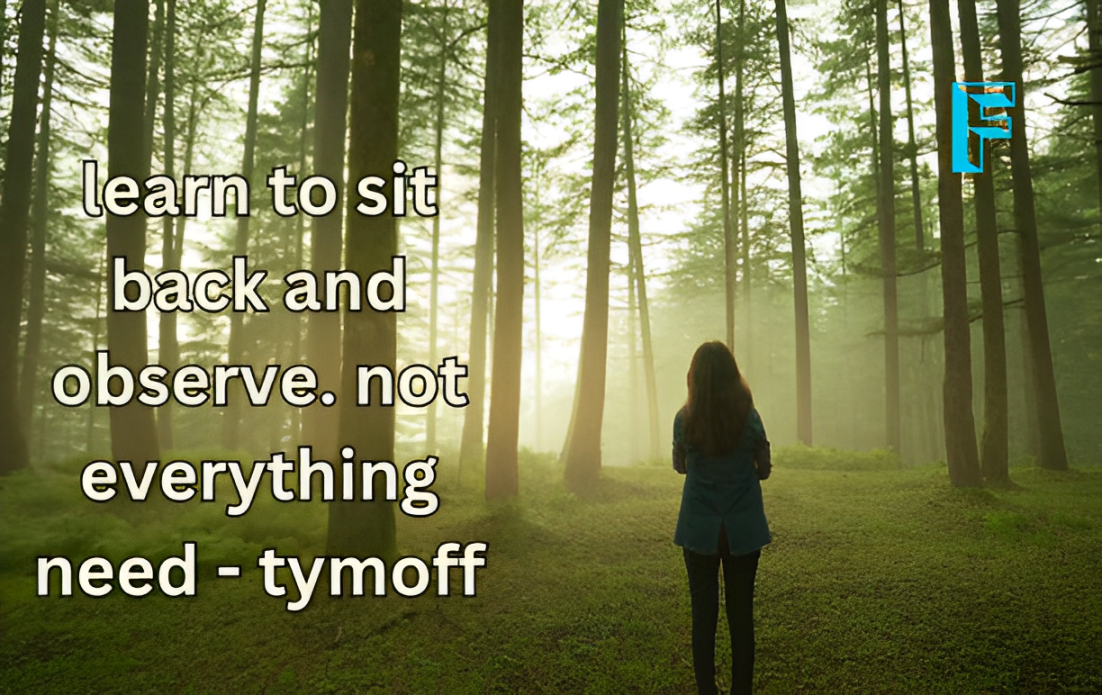learn to sit back and observe. not everything need – tymoff

Introduction:
learn to sit back and observe. not everything need – tymoff, In today’s fast-paced world, the ability to pause and observe has become a rarity. With constant distractions vying for our attention, we often find ourselves caught up in the whirlwind of tasks and responsibilities, neglecting the power of simply observing. However, there is great wisdom in learning to sit back and observe, as it allows us to gain clarity, insight, and a deeper understanding of ourselves and the world around us. In this article, we will explore the importance of embracing this practice, its benefits, and how it can lead to personal growth and fulfillment.

Understanding the Concept:
“Learn to sit back and observe. Not everything needs your reaction.” These words, attributed to the pseudonym “tymoff,” encapsulate the essence of the art of observing. Observing entails consciously stepping back from the urge to react impulsively to every situation and instead, adopting a stance of quiet observation. It involves being present in the moment, attentive to our surroundings, thoughts, and emotions, without feeling compelled to immediately respond.
Must Read=errordomain=nscocoaerrordomain&errormessage=could not find the specified shortcut.&errorcode=4
The concept of observing is deeply rooted in various philosophies and spiritual traditions. Practices such as mindfulness, meditation, and contemplation emphasize the importance of cultivating awareness and presence. By learning to observe without judgment or attachment, we can gain valuable insights into the nature of our minds and the world around us.
“Learn to sit back and observe. Not everything needs your reaction,” attributed to “tymoff,” encapsulates a profound philosophy that advocates for mindfulness, introspection, and emotional intelligence. The essence of this statement lies in the wisdom of restraint, urging individuals to resist the impulse to react impulsively to every situation. Instead, it encourages adopting a mindset of observation, where one can calmly and attentively observe the unfolding of events, thoughts, and emotions without feeling compelled to immediately respond.
At its core, this concept emphasizes the importance of cultivating a sense of awareness and detachment in various aspects of life. It suggests that by learning to step back and observe, individuals can gain invaluable insights into themselves and the world around them. Rather than being swept away by emotions or reacting out of habit, they can approach situations with clarity, discernment, and equanimity.
The practice of sitting back and observing is deeply rooted in mindfulness principles, which emphasize being present in the moment and non-judgmentally acknowledging one’s experiences. It encourages individuals to cultivate a heightened sense of awareness, paying attention to their thoughts, feelings, and surroundings with curiosity and acceptance.
By embracing this practice, individuals can experience a myriad of benefits that contribute to personal growth and well-being. Firstly, observing allows for greater clarity and insight into the nature of one’s mind and emotions. By stepping back from the immediacy of reactions, individuals can see situations more objectively, discern patterns, and understand underlying motivations.
Furthermore, learning to sit back and observe promotes emotional regulation and resilience. Instead of being driven by impulsive reactions, individuals can learn to manage their emotions effectively, responding to challenges with composure and mindfulness. This leads to healthier coping mechanisms and reduced stress levels.
Moreover, the practice of observation fosters deeper connections and improved relationships. By listening actively and observing others with empathy and understanding, individuals can strengthen their interpersonal skills and build more meaningful connections based on mutual respect and compassion.
In addition, sitting back and observing cultivates a sense of inner peace and contentment. By detaching from the constant need to control or react, individuals can experience a greater sense of ease and acceptance. This fosters a mindset of gratitude and appreciation for the present moment, leading to greater overall well-being.
Overall, “learn to sit back and observe. Not everything needs your reaction” serves as a powerful reminder of the importance of mindfulness, introspection, and emotional intelligence in navigating life’s complexities. By embracing this philosophy, individuals can cultivate a deeper understanding of themselves and the world around them, leading to greater fulfillment, resilience, and inner peace.
Benefits of Observing:
- Clarity and Insight: When we take the time to observe without reacting, we create space for clarity and insight to emerge. Instead of being swept away by our emotions or impulses, we can see things more objectively and discern patterns that may have otherwise gone unnoticed. This clarity allows us to make better decisions and navigate challenges with greater ease.
- Emotional Regulation: Observing helps us develop emotional intelligence by allowing us to observe our feelings without becoming overwhelmed by them. Rather than suppressing or denying our emotions, we can acknowledge them with compassion and curiosity. Through this process, we become better equipped to regulate our emotions and respond to situations in a balanced and constructive manner.

- Improved Relationships: By practicing active listening and observing in our interactions with others, we can deepen our understanding and empathy. Instead of jumping to conclusions or interrupting with our own opinions, we can truly listen to what others have to say and appreciate their perspective. This fosters more meaningful connections and reduces conflicts in relationships.
- Stress Reduction: Observing can be a powerful antidote to stress, as it allows us to step back from the constant stream of thoughts and worries that often plague our minds. By focusing on the present moment and observing our thoughts without getting caught up in them, we can experience a sense of calm and inner peace.
- Self-Discovery: Observing provides an opportunity for self-reflection and self-discovery. As we observe our thoughts, feelings, and behaviors, we gain insights into our underlying beliefs, fears, and desires. This self-awareness is essential for personal growth and can lead to greater authenticity and fulfillment.
Practical Tips for Cultivating Observing:
- Practice Mindfulness Meditation: Mindfulness meditation involves paying attention to the present moment with openness and curiosity. By dedicating a few minutes each day to mindfulness meditation, you can train your mind to observe without judgment and cultivate greater awareness.
- Take Regular Breaks: In the midst of your busy schedule, make it a point to take regular breaks to pause and observe. Whether it’s a short walk in nature, a few moments of deep breathing, or simply gazing out the window, these breaks allow you to recharge and reconnect with yourself.
- Keep a Journal: Keeping a journal can be a valuable tool for observing your thoughts and emotions. Take some time each day to write down your observations, reflections, and insights. This practice not only helps you clarify your thoughts but also provides a record of your personal growth journey.
- Engage in Active Listening: When interacting with others, practice active listening by giving them your full attention and observing their body language and tone of voice. Resist the urge to interrupt or formulate your response while they are speaking. Instead, focus on truly understanding their perspective.
- Cultivate Curiosity: Approach each moment with a sense of curiosity and wonder. Instead of jumping to conclusions or making assumptions, ask yourself questions such as “What am I observing in this situation?” or “What can I learn from this experience?” Cultivating curiosity opens the door to deeper understanding and insight.

FAQ
- What does the phrase “learn to sit back and observe” mean?
- It means to take a step back from immediate reactions and instead, observe situations, thoughts, and emotions with a sense of detachment and awareness.
- Why is observing important?
- Observing allows us to gain clarity, insight, and understanding by providing a perspective that is not clouded by immediate reactions or judgments.
- How can observing benefit personal growth?
- By observing, we can develop emotional intelligence, improve decision-making skills, deepen self-awareness, and foster better relationships, all of which contribute to personal growth.
- Does observing mean being passive?
- No, observing is an active practice that involves being present and attentive, but without necessarily reacting impulsively to every situation.
- How can one learn to sit back and observe in daily life?
- Through practices such as mindfulness meditation, journaling, active listening, and cultivating curiosity, one can develop the habit of observing in daily life.
- Does observing mean ignoring problems or challenges?
- No, observing allows us to see problems or challenges more clearly, which can actually facilitate finding effective solutions.
- Is it possible to observe without judgment?
- Yes, observing without judgment involves accepting things as they are without attaching labels or evaluating them as good or bad.
- Can observing help in reducing stress?
- Yes, observing can be a powerful tool for stress reduction as it enables us to detach from stressful thoughts and emotions and find a sense of calm and perspective.
- Is observing the same as procrastination?
- No, observing is not about avoiding or delaying action but rather about taking the time to understand situations more deeply before responding.
- Can observing improve communication skills?
- Yes, observing can enhance communication skills by promoting active listening, empathy, and a better understanding of others’ perspectives.
- Does observing mean being indifferent to what’s happening around us?
- No, observing involves being fully present and engaged with what’s happening around us, but without feeling compelled to react impulsively.
- Can observing help in conflict resolution?
- Yes, observing can facilitate conflict resolution by enabling us to see the underlying causes of conflicts and approach them with greater empathy and understanding.
- Is observing the same as analyzing?
- While observing may involve analysis to some extent, it is more about being open to what is happening in the present moment without getting caught up in overthinking or analysis paralysis.
- How can observing improve decision-making skills?
- By observing various aspects of a situation, such as emotions, motivations, and consequences, we can make more informed and rational decisions.
- Can observing enhance creativity?
- Yes, observing can stimulate creativity by allowing us to see familiar things from new perspectives and make unexpected connections.
- Is observing applicable only to personal situations?
- No, observing can be applied to both personal and professional situations, as it is a universal practice that fosters awareness and understanding.
- Does observing require a lot of time and effort?
- Not necessarily. Even dedicating a few minutes each day to observing can yield significant benefits over time.
- Can observing help in cultivating gratitude?
- Yes, observing can cultivate gratitude by helping us appreciate the beauty and abundance that surround us in everyday life.
- Is observing compatible with being proactive?
- Yes, observing can complement proactivity by providing a foundation of understanding and insight upon which to base proactive actions.
- Can observing lead to a more fulfilling life?
- Yes, by fostering deeper connections, greater self-awareness, and a sense of inner peace, observing can ultimately lead to a more fulfilling and meaningful life.
Conclusion:
Learning to sit back and observe is not a passive act but rather an intentional practice that requires patience, presence, and self-awareness. By embracing this practice, we can cultivate clarity, emotional intelligence, and deeper connections with ourselves and others. In a world that often glorifies busyness and action, the art of observing reminds us of the value of slowing down, tuning in, and appreciating the richness of the present moment. As we integrate this practice into our daily lives, we unlock a pathway to personal growth, fulfillment, and a deeper sense of purpose.
